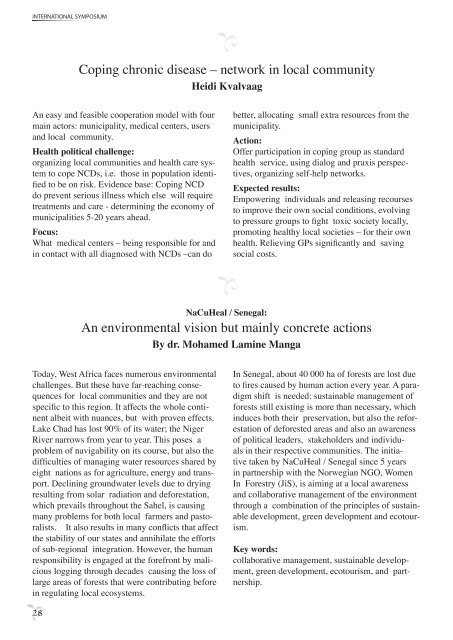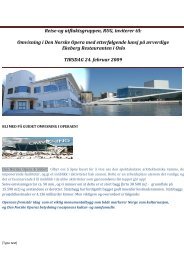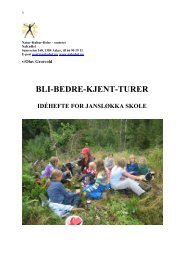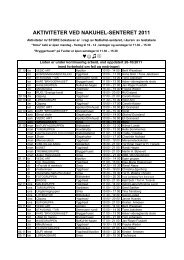Natur og Kultur som Folkehelse - NaKuHel
Natur og Kultur som Folkehelse - NaKuHel
Natur og Kultur som Folkehelse - NaKuHel
You also want an ePaper? Increase the reach of your titles
YUMPU automatically turns print PDFs into web optimized ePapers that Google loves.
INTERNATIONAL SYMPOSIUM<br />
Coping chronic disease – network in local community<br />
Heidi Kvalvaag<br />
An easy and feasible cooperation model with four<br />
main actors: municipality, medical centers, users<br />
and local community.<br />
Health political challenge:<br />
organizing local communities and health care system<br />
to cope NCDs, i.e. those in population identified<br />
to be on risk. Evidence base: Coping NCD<br />
do prevent serious illness which else will require<br />
treatments and care - determining the economy of<br />
municipalities 5-20 years ahead.<br />
Focus:<br />
What medical centers – being responsible for and<br />
in contact with all diagnosed with NCDs –can do<br />
28<br />
better, allocating small extra resources from the<br />
municipality.<br />
Action:<br />
Offer participation in coping group as standard<br />
health service, using dial<strong>og</strong> and praxis perspectives,<br />
organizing self-help networks.<br />
Expected results:<br />
Empowering individuals and releasing recourses<br />
to improve their own social conditions, evolving<br />
to pressure groups to fight toxic society locally,<br />
promoting healthy local societies – for their own<br />
health. Relieving GPs significantly and saving<br />
social costs.<br />
NaCuHeal / Senegal:<br />
An environmental vision but mainly concrete actions<br />
By dr. Mohamed Lamine Manga<br />
Today, West Africa faces numerous environmental<br />
challenges. But these have far-reaching consequences<br />
for local communities and they are not<br />
specific to this region. It affects the whole continent<br />
albeit with nuances, but with proven effects.<br />
Lake Chad has lost 90% of its water; the Niger<br />
River narrows from year to year. This poses a<br />
problem of navigability on its course, but also the<br />
difficulties of managing water resources shared by<br />
eight nations as for agriculture, energy and transport.<br />
Declining groundwater levels due to drying<br />
resulting from solar radiation and deforestation,<br />
which prevails throughout the Sahel, is causing<br />
many problems for both local farmers and pastoralists.<br />
It also results in many conflicts that affect<br />
the stability of our states and annihilate the efforts<br />
of sub-regional integration. However, the human<br />
responsibility is engaged at the forefront by malicious<br />
l<strong>og</strong>ging through decades causing the loss of<br />
large areas of forests that were contributing before<br />
in regulating local ecosystems.<br />
In Senegal, about 40 000 ha of forests are lost due<br />
to fires caused by human action every year. A paradigm<br />
shift is needed: sustainable management of<br />
forests still existing is more than necessary, which<br />
induces both their preservation, but also the reforestation<br />
of deforested areas and also an awareness<br />
of political leaders, stakeholders and individuals<br />
in their respective communities. The initiative<br />
taken by NaCuHeal / Senegal since 5 years<br />
in partnership with the Norwegian NGO, Women<br />
In Forestry (JiS), is aiming at a local awareness<br />
and collaborative management of the environment<br />
through a combination of the principles of sustainable<br />
development, green development and ecotourism.<br />
Key words:<br />
collaborative management, sustainable development,<br />
green development, ecotourism, and partnership.





